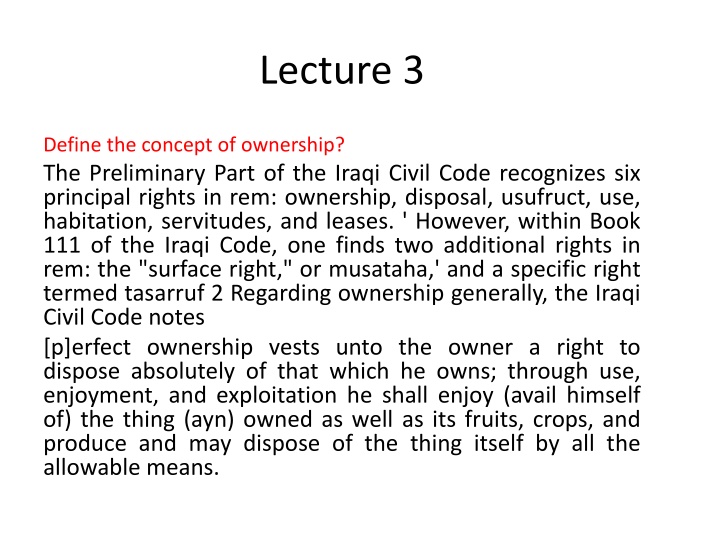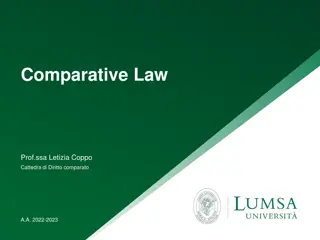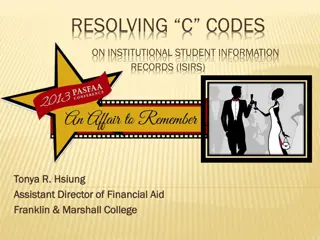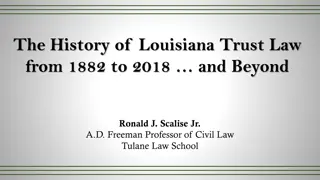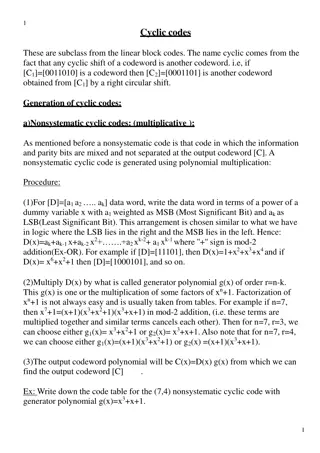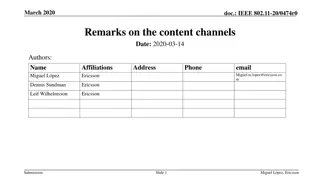Comparison of Ownership Concepts in the Iraqi and Louisiana Civil Codes
The preliminary part of the Iraqi Civil Code recognizes various rights in rem, including ownership, disposal, usufruct, use, habitation, servitudes, and leases. It details the concept of ownership, perfect ownership rights, and additional rights such as "surface right" and tasarruf. The Iraqi Code also defines property, usufruct, use, and habitation, aligning with civil law principles. Servitudes are explained as rights that limit the enjoyment of immovables for the benefit of others. The Iraqi and Louisiana Civil Codes share common property law aspects, reflecting a similar legal theory.
Download Presentation

Please find below an Image/Link to download the presentation.
The content on the website is provided AS IS for your information and personal use only. It may not be sold, licensed, or shared on other websites without obtaining consent from the author.If you encounter any issues during the download, it is possible that the publisher has removed the file from their server.
You are allowed to download the files provided on this website for personal or commercial use, subject to the condition that they are used lawfully. All files are the property of their respective owners.
The content on the website is provided AS IS for your information and personal use only. It may not be sold, licensed, or shared on other websites without obtaining consent from the author.
E N D
Presentation Transcript
Lecture 3 Define the concept of ownership? The Preliminary Part of the Iraqi Civil Code recognizes six principal rights in rem: ownership, disposal, usufruct, use, habitation, servitudes, and leases. ' However, within Book 111 of the Iraqi Code, one finds two additional rights in rem: the "surface right," or musataha,' and a specific right termed tasarruf 2 Regarding ownership generally, the Iraqi Civil Code notes [p]erfect ownership vests unto the owner a right to dispose absolutely of that which he owns; through use, enjoyment, and exploitation he shall enjoy (avail himself of) the thing (ayn) owned as well as its fruits, crops, and produce and may dispose of the thing itself by all the allowable means.
Lecture 3 Q : Define property under Iraqi law and enumerate its kinds? like the Louisiana Code, the Iraqi Civil Code's article defining property reflects the civil law distinction between usus, fructus, and abusus. This adherence to Roman principles is made express in the Iraqi articles that articulate the civilian concept of usufruct." Article1252 notes that "[tihe usufructuary may use the thing the subject matter of the usufruct and its accessories; he may acquire the fruits thereof during the period of enjoyment and the products .. . belong[ing] to him; he shall replenish anything of the principal thing which has been expended."
Lecture 3 Define the concept of habitation ? Like the Louisiana Code, the Iraqi Civil Code also contains specific articles allowing the conveyance of the rights of use and habitation. 6 Iraqi Article 1261 expressly states that "[t]he alienation of a benefit which is restricted to enjoyment [use] or habitation is valid., Neither the right of use nor the right of habitation may be assigned to a third party except pursuant to an express stipulation or a strong justification.
Lecture 3 Define the concept of servitude ? The Iraqi Civil Code maintains the civilian concept of the servitude, stating: "A servitude is a right which limits the enjoyment of an immovable for the benefit of another immovable belonging to another owner. Though there are no definitional articles expressly on this point, the Iraqi Civil Code clearly envisions this as a charge on a servient estate for the benefit of a dominant estate, with the Iraqi articles specifically referring to dominant and servient immovables.9
Thus, both the Louisiana and Iraqi Civil Codes, in adherence to the civilian tradition, contain common concepts aspects of the law of property. Indeed, one sees that the two codes share the same basic theory. regarding important
